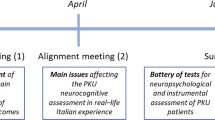Abstract
Forty years after Horst Bickel first treated a patient suffering from phenylketonuria (PKU) our aim is to assess the current treatment of Austrian patients. A total of 70 children − 60 with PKU and 10 with hyperphenylalaninaemia (HPA) — aged 6–16 years were investigated in terms of somatic and intellectual parameters. Their development is normal (PKU: mean IQ=95.40; HPA: mean IQ=101.85) owing to strict dietary control, above all during their first 6 years of life. A comparison of the IQ data of 17 PKU children and their healthy siblings at the age 6 years showed significant correlations in verbal, performance and IQ measurements. Austrian PKU patients do achieve normal IQ values but these measurements fail to guarantee the quality of dietary control. IQ is influenced by a number of variables: genetic, social environment, education and furtherance, motivation for performance, etc., and, in PKU patients, dietary control. The only currently known way of maintaining and improving dietary compliance in PKU patients and their families remains good informative counselling about the disease and psychosocial support.
Similar content being viewed by others
Abbreviations
- HAWIE :
-
Hamburg-Wechsler Intelligenztest für Erwachsene
- HAWIK-R :
-
Hamburg-Wechsler Intelligenztest für Kinder, Revision 1983
- HPA :
-
hyperphenylalaninaemia
- Phe :
-
phenylalanine
- PKU :
-
phenylketonuria
- WAIS :
-
Wechsler Adult Intelligence Scale
- WISC-R :
-
Wechsler Intelligence Scale for Children — revised
References
Fischer GH, Pendl P (1980) Individualized testing on the basis of the dichotomous Rasch model. In: Kamp LJT van der, Langerak WF, Gruijter DNM de (eds) Psychometric for educational debates. Wiley, New York, pp 171–187
Flynn JR (1984) The mean IQ of Americans: Massive gains 1923 to 1978. Psychol Bull 95:29–51
Flynn JR (1987) Massive gains in 14 nations: What IQ tests really measure. Psychol Bull 101:171–191
Kleining G, Moore H (1968) Soziale Selbsteinstufung. Kölner Z Soziol Sozialpsychol 20:502–552
Koch R, Wenz E (1987) Phenylketonuria. Annu Rev Nutr 7:117–135
Kubinger K, Wurst E (1985) AID Adaptives Intelligenz-Diagnostikum. Beltz-Test, Weinheim
Prader A (1982) Physical growth of Swiss children from birth to 20 years of age. First Zurich longitudinal study of growth and development. Helv Paediatr Acta 52: 1–125
Scheibenreiter S, Thalhammer O (1972) Hyperphenylalaninemia or Phenylketonuria (PKU)? Problems of early distinction in 15 and 34 cases respectively. Z Kinderheilkd 112: 153–162
Stellungnahme der Arbeitsgemeinschaft für Pädiatrische Stoffwechselstörungen (APS) zur diätetischen Behandlung der Phenylketonurie. Monatsschr Kinderheilkd 1990, 138:636
Author information
Authors and Affiliations
Rights and permissions
About this article
Cite this article
Scheibenreiter, S., Tiefenthaler, M., Hinteregger, V. et al. Austrian report on longitudinal outcome in phenylketonuria. Eur J Pediatr 155 (Suppl 1), S45–S49 (1996). https://doi.org/10.1007/PL00014248
Issue Date:
DOI: https://doi.org/10.1007/PL00014248




